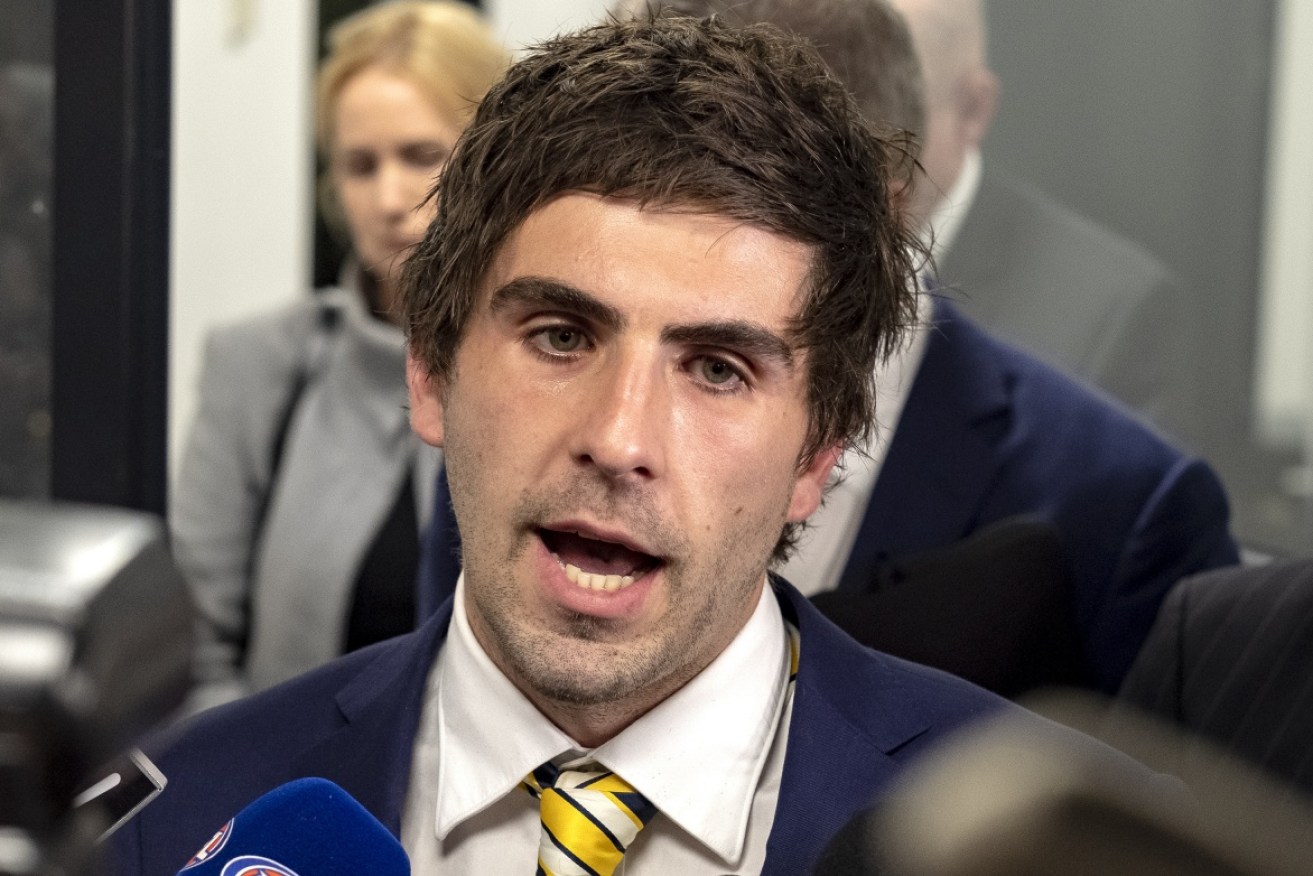AFL ‘gets it right’ with eight-week punch verdict


Andrew Gaff says the past 48 hours were the "toughest of his life" after copping an eight-week ban. Photo: AAP
The AFL is having trouble pleasing anyone these days, and there’s sure to be enough people unhappy again with the eight-game suspension meted out to West Coast star Andrew Gaff for breaking the jaw of Fremantle opponent Andrew Brayshaw.
But the rulings of the AFL’s judiciary arm are probably the most hotly contested of all the league’s decision-making processes. And I think this is one the tribunal got right.
Eight games ends Gaff’s season, and any hope of being part of a 2018 West Coast premiership team. It might be the push that tips the Eagles’ flag hopes over the edge, too. Tough calls on both player and club.
Anything less than a seven-game penalty could have potentially had Gaff back this season were the Eagles to lose a home final first-up and recover to reach the premiership playoff.
And that plainly would have caused a major outcry given Brayshaw will not only be missing the rest of the Dockers’ season but eating through a straw for several weeks.
The heavier penalties being called for from various quarters – ranging anywhere from 12 games to an entire year – I believe, would have been too harsh on a player clearly shattered by his own actions.
Such a lengthy ban would also cause damage to the very promising young footballer Gaff was too only a few years ago.
As it is, Gaff will have to cool his heels for the early going in 2019 as well, anything up to a month if West Coast ends up making an early exit from the finals.

Fremantle’s Andrew Brayshaw is helped from the field after the punch. Photo: AFL Media/Getty
Gaff, as far from the definition of a football thug as is humanly possible, was clearly genuine in his remorse, from shortly after the end of Sunday’s game, when he sought permission from his club to make a public, televised apology, through Tuesday night’s tribunal hearing, and again publicly immediately afterwards.
Should that be a mitigating factor? I think so, given his unblemished record and until now scrupulously fair playing reputation. As for the remorse, well, I can’t think of another occasion when I’ve seen a player on the interchange bench in tears at what he’d done to an opponent.
“So what?” many will respond. But if the courts are prepared to take character evidence into account when it comes to sentencing, why shouldn’t a football tribunal?
Some historical context is also important. Gaff’s eight-game suspension is the heaviest applied by the AFL tribunal to any single incident since Fremantle’s Dean Solomon also was rubbed out for eight games in 2008 for striking Geelong’s Cameron Ling.
It’s one game more even than Barry Hall received the same season for his infamous KO of West Coast’s Brent Staker. And while Fremantle coach Ross Lyon drew upon that very example last Sunday night, does anyone seriously believe Gaff had the same degree of malicious intent as Hall did that evening?
Of course community standards have changed even since then. The “one punch can kill” campaigns and repeated tragic stories about the victims of those punches on the street have clearly had a profound impact on society’s tolerance of violence of any sort, which is welcome.

The enormity of his actions hits Andrew Gaff on the bench on Sunday. Photo: Getty
But the drawing of direct parallels between violence on the street and in an AFL game never sits comfortably with me. They are completely different environments, the latter one of expected and usually warranted physical contact and at least a degree of constant aggression.
The Gaff report and suspension has predictably also reignited debate about the introduction of a “send-off” rule. That is another whole Pandora’s box waiting to be opened, with as many potential problems as justifications for its institution.
It’s a debate we probably need to have, too, given how dramatically attitudes to the use of physical force on the football field have changed.
But Gaff doesn’t deserve to be the “poster boy” for an example of football thuggery. He’s not one, and no one who knows him or has ever seen him play for more than five minutes would dare suggest he is.
He’s just received the heaviest penalty AFL football has dished out to a reported player for 10 years. It has ended what had been a brilliant individual season, ruined his dreams of being part of a premiership side, and will inevitably be part of his CV for the rest of his career. That’s probably enough punishment, isn’t it?








